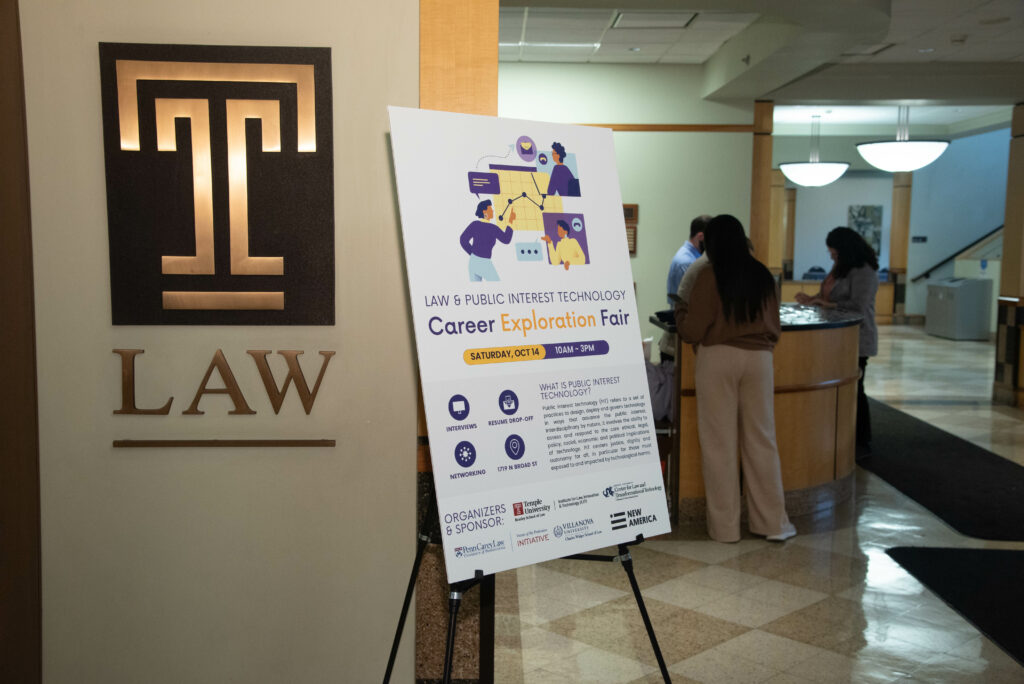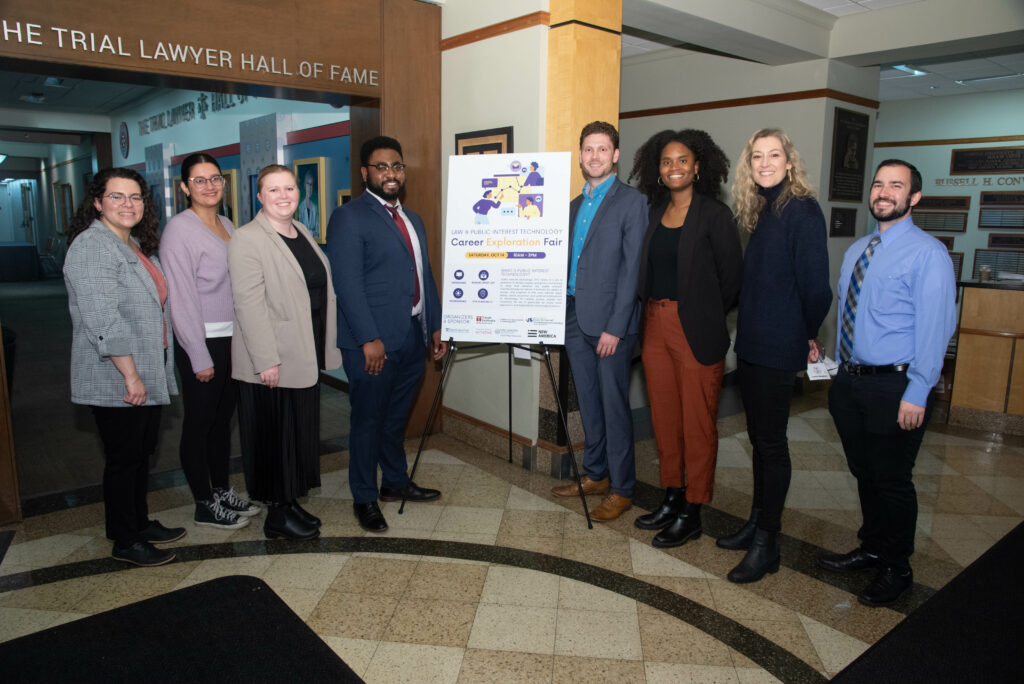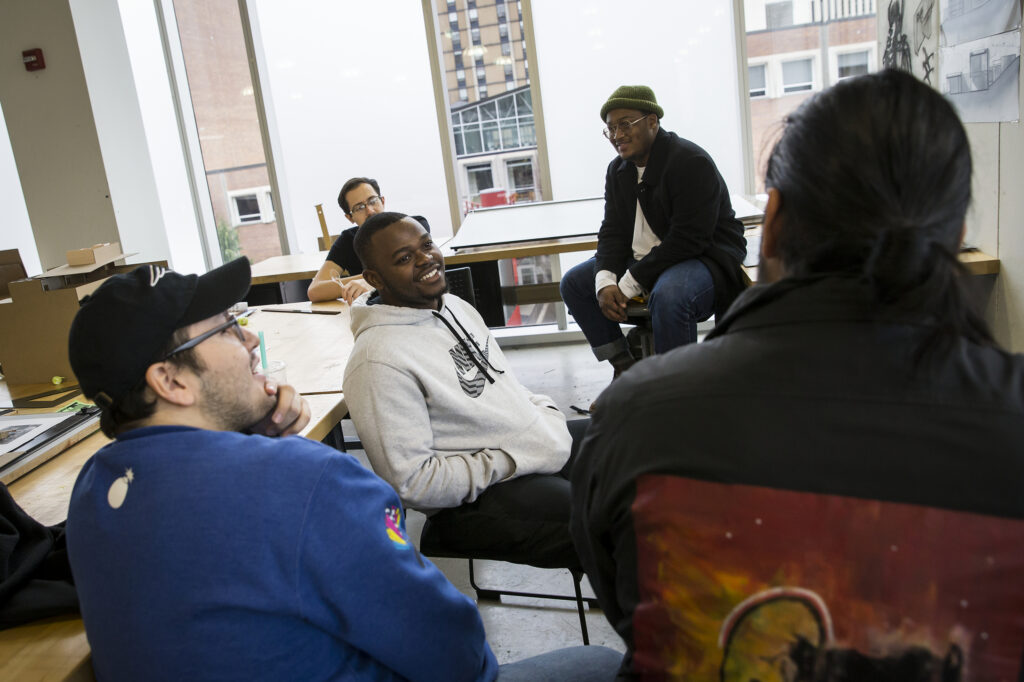PIT Law: Forging a Just Technological Future
Defending Democracy
November, 2023

Author: Laura Bingham is Professor of Practice and founding Executive Director of the Institute for Law, Innovation & Technology (iLIT) at Temple University, Beasley School of Law. She engages in research, advocacy, and litigation on global migration, cybernorms, digital surveillance and human rights with a focus on the influence of geopolitics on multiple dimensions of lawmaking, justice institutions and law enforcement.
What is Public Interest Technology?
5 Keys to Institutionalizing PIT
What is PIT-UN?
Both law and technology are powerful tools built by humans to improve human life; however, as professions they are also inaccessible to most people even as they hold immense sway over societies and profoundly impact democratic institutions. Furthermore, they tend to be professional fields dominated by powerful interests that tend to maintain the status quo. Serving the public interest through law and technology is no simple matter.
The field of public interest law has for over a century allowed law students and legal professionals in the U.S. to use their skills to protect and advance civil and human rights and democracy. It has a rich tradition of moral and ethical inquiry into the values and tools that guide legal practice, and has much to offer to the comparatively younger field of public interest technology. In fact, public interest law was the model on which PIT-UN was founded in 2018.
As a public interest lawyer by training, I run Temple University’s Institute for Law, Innovation & Technology (iLIT), which aims to ensure that the field of digital technology bridges existing divides, remedies the systemic under-representation of minorities and other marginalized peoples, and innovates in ways that clearly advance the broad, global, public interest. Launched in 2022, we leverage law and legal education as tools – however imperfect – in the service of this mission. There is no doubt that public interest technology (PIT) and the Public Interest Technology University Network (PIT-UN) are pivotal platforms for realizing our mission.
Photographs courtesy of Temple University and Temple Law
At iLIT, we focus on cultivating lawyers from underprivileged socioeconomic backgrounds, first generation lawyers, LGBTIQ+ lawyers, and others from underrepresented communities to attain positions in which they can shape technologies and the laws that govern them. Technological advancements present a major area of contestation over the state of the law because these developments massively impact how people communicate, how they govern and are governed, how they engage in military operations, consume and distribute resources, and so much more. I witness these realities firsthand while working in international human rights in lower to middle-income countries, where U.S. tech exports touted as public interest products often harmed individual rights and democracy. Public interest lawyering has multiple compelling areas of overlap with public interest technology.
At Temple iLIT, we see two early challenges to address in building meaningful, rewarding and actionable links between PIT and public interest law. First, we need to more clearly define PIT Law as an area of education and practice, in a language that speaks to current and prospective students, practitioners, administrators, and instructors. Second, we need to forge achievable career pathways for law students, especially students from underrepresented backgrounds, who want to pursue careers in public service.
Digital Transformation: a Laboratory for PIT Law
Digital transformation of governments – the adoption and implementation of digital technologies to administer public goods like education, healthcare and housing – is proving to be a useful laboratory for defining applications of PIT Law and the skills PIT lawyers must develop. iLIT collaborates with over 50 partners in five regions through the Internet Governance Forum who are contending with what digital transformation really means for communities and government institutions.
The contexts vary greatly, and the systems driving digital transformation are conditioned by complex social and technical factors. The temptation to overemphasize the benefits of digital transformation however is immense, due to domestic and international political pressure, economic incentives, and the need to address extant hurdles to fair, equitable and open government.
The companies who design these technologies, and the politicians eager to implement them, claim that large-scale digital systems increase access to government services, helping us side-step bureaucratic bloat and expose fraud and corruption. But we can’t assume that good intentions always lead to good governance, nor should we assume that the tools will be continually used in a benevolent and just way. To offer just one example, communities with insecure legal status or inadequate documentation of their legal identity are often left out of digital ID systems entirely or reclassified with suspicion, further marginalizing them from basic rights and protections of the state. These are not prevalent debates in the U.S., even though digital services initiatives at federal and state level are ramping up.
Digital public benefits systems also hold considerable potential to undermine democratic institutions, to exclude and police access to essential services, to enable unchecked surveillance, and to warp power balances between branches of government. This is all developing as we enter 2024, a year of pivotal democratic elections not only in the U.S. but also in over 50 countries from India to the EU comprising over 2 billion voters.
During this crucial time, we are aiming to train lawyers who can understand the risks to democracy opened up by digital transformation, and to adapt their knowledge of law and legal institutions to address these risks with the most vulnerable populations in mind.
Pathways to Public Service
Many of the pedagogical foundations for public interest lawyering translate to PIT because both fields focus on power dynamics, listening and serving communities and asking fundamental questions of value, regardless of the technology or technological question of the day. The skills students learn through public interest law include methods of community engagement and consultation, working with movement organizations, and cultivating a consciousness of power differentials, privilege, and how to use specialized expertise in the service of a vision that is defined by those without the same access to knowledge, power, and resources.
In spring 2024 iLIT will launch a legal clinic where students will learn how to address technological harms through seminars on data justice and community-based research, advocacy and litigation projects. Through this clinic, we hope to debunk the notion that technology law is only for people with STEM backgrounds, or that IP or compliance jobs are the only option for lawyers interested in technology and its social effects.
In addition to the legal clinic, our 2023 Challenge Grant funding will support the creation of Gen Ed courses to expand multidisciplinary curriculum offerings on PIT across departments at Temple. In response to the Biden Administration’s 2022 AI Bill of Rights, we organized with Temple’s Public Policy Lab based at the College of Liberal Arts a student-led presentation and discussion with humanities scholars, connecting departments and students around this whole-of-society issue, and 2e are excited to continue building relationships within the humanities and social sciences.
In a similar vein, before the official launch of iLIT we drafted and submitted comments on the AI Bill of Rights with our students. With co-authors at the New York University Law School’s Center for Human Rights and Global Justice, we emphasized how much there is to learn from other jurisdictions about the impacts and regulation of AI-enabled biometric technologies like fingerprint and facial recognition matching systems, and we pushed for stronger protections against automated discrimination. As federal and state government looks to create regulatory frameworks for AI, we anticipate that requests for information will continue to be a fruitful space for our students to gain hands-on PIT law experience.


Temple was one of nine PIT-UN members awarded grant funding for PIT Career Fairs in 2023. Photos courtesy of Temple iLIT.
The Need to Diversify Career Pathways
Our second challenge is to translate our educational foundations and programming into solid job opportunities and career pathways for our law students. The law profession generally, and public interest law and tech law specifically, remain highly white and male, especially at senior leadership levels. Diversifying the field is core to our mission at iLIT
To build a diverse pipeline of PIT lawyers, we have to create better employment opportunities for our students. The social and financial pressures for law students to join commercial firms are immense, especially for students from marginalized backgrounds who are often responsible for paying back hefty law school loans in addition to providing for their families. Because entry level public interest roles have low salaries, they are often feasible only for students from privileged backgrounds who can rely on family resources to cover law school loans and cover the cost of living. Many students who enter law school with a passion for social justice experience a loss of autonomy, agency and optimism about a career in public service due to these pressures.
Our desire to help students navigate this landscape shaped our October 2023 Law & PIT Career Exploration Fair, co-organized with three other major Philadelphia-area law schools – Penn Carey Law School, Villanova Law School and Drexel Kline School of Law.
Our aim is to expose students to the diverse range of post-graduation professional opportunities that constitute working in law and public interest technology. We hope that career fairs will continue to introduce students to the possibilities of PIT law in industry, government and non-profit work.
Another major goal of the Law & PIT Career Exploration Fair was to forge sustained relationships with participating employers. We were thrilled at the volume and high quality of employer participation, with over ten employers participating from across the region and the country, including federal and city agencies, national civil society organizations, industry leaders, and major Philadelphia and New York legal aid organizations. We will now be using 2023 Challenge Grant-supported stipends to place students in summer internships with some of the employers who made the fair possible, translating the event into concrete opportunities for students.
Future Possibilities
Temple is buzzing with activity that can be harnessed for public interest technology. The Institute for Entrepreneurship & Innovation at Fox Business School runs an annual social impact challenge and is spearheading a Social Impact Council on campus. In 2024, iLIT will work with the College of Science and Technology’s Professional Science Masters program in Bioinnovation on a Gen Ed course on law and innovation. In our own city of Philadelphia, the multi-institution community that designed the Career Exploration Fair will continue to be a strong foundation for future collaborations like an upcoming social justice hackathon based on our past collaboration, and plans in the works for additional social justice programming in 2024.
We see PIT and public interest law as natural companions, and look forward to building new collaborations that can address the shared aims of both fields. For more information on our work, you can visit our website or reach out directly to us at ilit [at] temple.edu.


